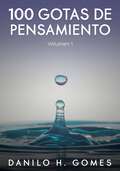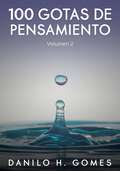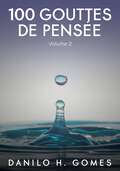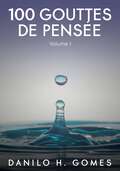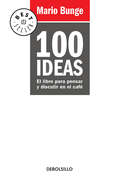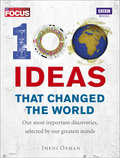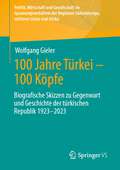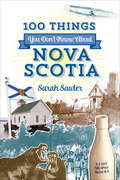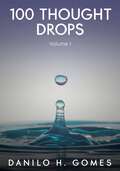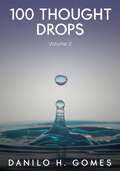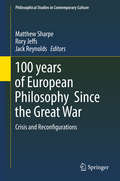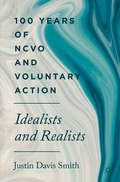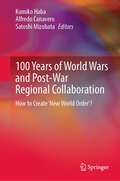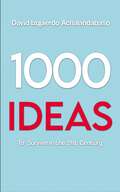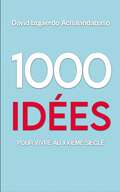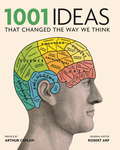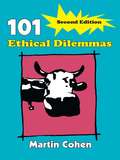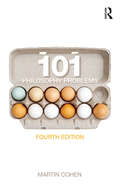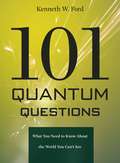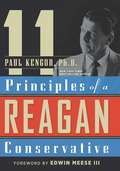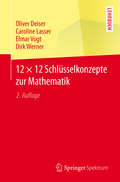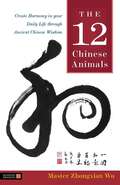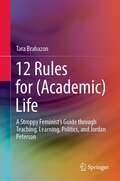- Table View
- List View
100 gotas de pensamiento: Frases como gotas para los ojos del alma
by Danilo H. GomesEn ciertos momentos de la vida, todo lo que necesitamos son unas pocas gotas de agua en los desiertos de la existencia humana. Dentro de la mente de cada persona podemos encontrar un verdadero mar de sentimientos, ideas y esperanzas. Este mar puede ser externalizado por gotas cargadas de sabiduría. 100 GOTAS DE PENSAMIENTO es una compilación de 100 hermosas frases para animar el alma, dirigir la mente hacia Dios y plantear buenas preguntas reflexivas. Sacia tu sed y desborda a los que te rodean.
100 gotas de pensamiento: Volumen 2
by Danilo H. GomesExpresamos nuestros pensamientos frecuentemente. A menudo, estas expresiones tocan la realidad en forma de gotas. Una frase aquí, un gesto allá. Prestamos atención tanto a las gotas que salen como al mar que existe dentro del ser.
100 gouttes de pensée: Volume 2
by Danilo H. GomesÀ certains moments de la vie, il suffit de quelques gouttes d'eau dans les déserts de l'existence humaine. Dans l'esprit de chacun, on peut trouver une véritable mer de sentiments, d'idées et d'espoirs. Cette mer peut être extériorisée par des gouttes de sagesse. 100 GOUTTES DE PENSÉE est une compilation de 100 belles phrases pour encourager l'âme, orienter l'esprit vers Dieu et soulever de bonnes questions de réflexion. Étanchez votre soif et débordez sur votre entourage.
100 gouttes de pensée: Volume 1
by Danilo H. GomesÀ certains moments de la vie, il suffit de quelques gouttes d'eau dans les déserts de l'existence humaine. Dans l'esprit de chacun, on peut trouver une véritable mer de sentiments, d'idées et d'espoirs. Cette mer peut être extériorisée par des gouttes de sagesse. 100 GOUTTES DE PENSÉE est une compilation de 100 belles phrases pour encourager l'âme, orienter l'esprit vers Dieu et soulever de bonnes questions de réflexion. Étanchez votre soif et débordez sur votre entourage.
100 ideas: El Libro Para Pensar Y Discutir En El Cafe
by Mario BungeUn diccionario de sentido común y de lógica que se convierte en un librorevolucionario. Cien ideas parecen muchas antes de que uno se ponga a contarlas. Es loque hace Mario Bunge con paciencia, claridad y sencillez en este libro,tan bueno que hasta parecen pocas. La tarea le permite iluminarse (eiluminarnos) para que las ideas participen luego en nuestras charlas,para que encontremos en ellas temas y motivos que fortalezcan esa granpasión que nos precedía: la amistad.La sobriedad y la elegancia con las que cada una de estas ideas esexpuesta, y la concisión y el método que ameritan, aportan un deliciosoempeño: que las palabras sirvan para que podamos entendernos mejor.Nunca falta una idea cuando Mario Bunge escribe, y si parece que unasobra, se debe a la generosa actitud del autor, que nos la concede comoyapa.
100 IDEAS (EBOOK)
by Mario BungeCien ideas parecen muchas antes de que uno se ponga a contarlas. Es lo que hace Mario Bunge con paciencia, claridad y sencillez en este libro, tan bueno que hasta parecen pocas. La tarea le permite iluminarse (e iluminarnos) para que las ideas participen luego en nuestras charlas, para que encontremos en ellas temas y motivos que fortalezcan esa gran pasión que nos precedía: la amistad. La sobriedad y la elegancia con las que cada una de estas ideas es expuesta, y la concisión y el método que ameritan, aportan un delicioso empeño: que las palabras sirvan para que podamos entendernos mejor. Nunca falta una idea cuando Mario Bunge escribe, y si parece que una sobra, se debe a la generosa actitud del autor, que nos la concede como yapa.
100 Ideas that Changed the World: Our Most Important Discoveries, Selected By Our Greatest Minds
by Jheni OsmanEvery once in a while, an idea comes along that makes the entire world sit up and take notice. From the earliest understandings of our place in the solar system, via Darwinism, DNA, neutrons and quarks, right up to the theories that are pushing the boundaries of our knowledge today, we are forever propelled forward by our most gifted scientific minds. In this fascinating book, former BBC Focus magazine editor Jheni Osman explores 100 of the most forward thinking, far-reaching and downright inspired ideas and inventions in history, each nominated by experts from all fields of science and engineering. With selections from established authorities such as Brian Cox, Patrick Moore, Richard Dawkins and Marcus du Sautoy, Osman covers topics as diverse as the Big Bang, vaccination, computing, radioactivity, human genomes, the wheel and many more. Each essay looks at the logic behind these great inventions, discoveries, theories and experiments, studying the circumstances that brought them into being and assessing the impact that they had on the world at large. An intriguing and thought-provoking collection, 100 Ideas that Changed the World offers us a glimpse into the minds behind history's greatest eureka moments.
100 Jahre Türkei – 100 Köpfe: Biografische Skizzen zu Gegenwart und Geschichte der türkischen Republik 1923-2023 (Politik, Wirtschaft und Gesellschaft im Spannungsverhältnis der Regionen Südosteuropa und Mittlerer Osten)
by Wolfgang GielerZum 100-jährigen Jubiläum der Gründung der türkischen Republik am 29. Oktober 2023 werden 100 Personen aus der Türkei vorgestellt, die nicht nur die Politik, sondern auch die Wirtschaft, Wissenschaft, Gesellschaft und Kultur des Landes entscheidend charakterisiert und beeinflusst haben.Neben ehemaligen und aktuellen Politiker*innen, Staats- und Regierungschef*innen, Außenminister*innen werden insbesondere auch Schriftsteller*innen, Wissenschaftler*innen, Künstler*innen, Musiker*innen, Designer*innen, Sportler*innen anhand ihrer Biografien behandelt und in den jeweiligen zeithistorischen Kontext gestellt. Der Band ist um ein erweitertes Verständnis der Türkei bemüht. Wesentlicher Beweggrund des Autors – der 15 Jahre an verschiedenen türkischen Universitäten gelehrt hat - ist hierbei eine zumeist fehlende Auseinandersetzung mit den in der Türkei handelnden Personen anzuregen und damit die Türkei auch besser zu verstehen.
100 Things You Don't Know About Nova Scotia
by Sarah SawlerThe author of 100 Things You Don&’t Know About Atlantic Canada for Kids shares 100 intriguing facts about the Bluenoser Province. Did you know that the Halifax–Dartmouth ferry was once operated by a team of nine horses? Or that Babe Ruth used to visit Yarmouth regularly for hunting and fishing vacations? Enter journalist Sarah Sawler: your guide to discovering 100 fascinating things you don&’t know about Nova Scotia—from robberies and murders to famous landmarks, events, and people. Inspired by the success of her popular Halifax Magazine column &“50 Things You Don&’t Know about Halifax,&” Sawler has expanded her focus to include interesting anecdotes and facts about the social, political, economic, and cultural history of the entire province. Arranged in chronological order, each &“thing&” is accompanied by a contextual write-up explaining its historical significance. Includes twenty-five black and white photos.
100 Thought Drops: Phrases like eye drops for the soul's eyes
by Danilo H. GomesAt certain times in life, all we need is a few drops of water in the midst of the deserts of human existence. Within each person's mind we can find a real sea of feelings, ideas and hopes. This sea can be externalized by drops laden with wisdom. 100 THOUGHT DROPS is a compilation of 100 beautiful phrases to nourish the soul, bring the mind to God and raise good reflective questions. Quench your thirst and overflow to all of those around you.
100 Thought Drops: Volume 2 (100 Thought Drops #2)
by Danilo H. GomesInstead of feeding your mind with trivial things, why not drink, day after day, a drop of reflection? At certain moments in life, all we need is a few drops of water amidst the deserts of human existence. Inside the mind of each person, we can find a true sea of feelings, ideas, and hopes. This sea can be externalized by drops laden with wisdom. "100 Thought Drops" is a compilation of 100 beautiful phrases to encourage the soul, lead the mind to God, and stir up good reflective questioning. Quench your thirst and overflow to those around you.
100 years of European Philosophy Since the Great War: Crisis and Reconfigurations (Philosophical Studies in Contemporary Culture #25)
by Matthew Sharpe Jack Reynolds Rory JeffsThis book is a collection of specifically commissioned articles on the key continental European philosophical movements since 1914. It shows how each of these bodies of thought has been shaped by their responses to the horrors set in train by World War I, and considers whether we are yet 'post-post-war'. The outbreak of World War I in August 1914,set in chain a series of crises and re-configurations, which have continued to shape the world for a century: industrialized slaughter, the end of colonialism and European empires, the rise of the USA, economic crises, fascism, Soviet Marxism, the gulags and the Shoah. Nearly all of the major movements in European thinking (phenomenology, psychoanalysis, Hegelianism, Marxism, political theology, critical theory and neoliberalism) were forged in, or shaped by, attempts to come to terms with the global trauma of the World Wars. This is the first book to describe the development of these movements after World War I, and as such promises to be of interest to philosophers and historians of philosophy around the world.
100 Years of NCVO and Voluntary Action: Idealists and Realists
by Justin Davis SmithThis book explores the rich history of voluntary action in the United Kingdom over the past 100 years, through the lens of the National Council for Voluntary Organisations (NCVO), which celebrates its centenary in 2019. From its establishment at the end of the First World War, through the creation of the Welfare State in the middle of the twentieth century, to New Labour and the Big Society at the beginning of this century, NCVO has been at the forefront of major developments within society and the voluntary movement. The book examines its many successes, including its role in establishing high-profile charities such as Age Concern, the Youth Hostels Association, and National Association of Citizens’ Advice Bureaux. It charts the development of closer relations with the state, resulting in growing awareness of the value of voluntary action, increased funding, and beneficial changes to public policy, tax and charity law. But it also explores the criticisms NCVO has faced, in particular that by pursuing a partnership agenda and championing professionalisation, it has contributed to an erosion of the movement’s independence and distinctiveness.
100 Years of World Wars and Post-War Regional Collaboration: How to Create 'New World Order'?
by Kumiko Haba Alfredo Canavero Satoshi MizobataThis book is about the 100 years of World Wars and Regional Collaboration in the twentieth and twenty-first centuries, investigating and considering how to foster Good Governance and New World Order. The world is currently at the historical turning point. The twentieth century witnessed two World Wars (WWI and WWII), followed by the Cold War that dominated geopolitics. Amidst the post-war devastation, the European Community, soon succeeded by the European Union, came into being. Peaceful governance was nurtured by building economic collaboration and institutions and by establishing liberalism, democracy and the rule of law. In Asia, the Association of Southeast Asian Nations (ASEAN) also pursued regional governance after WWII, but in East Asia, the American Divide and Rule policy is continuing until now by the influence of China, North Korea and Russia. In the contemporary world in the twenty-first century, a new nationalism, Populism and Authoritarianism are spreading. At the same time, a wave of rapid economic growth is occurring in developing countries, especially in China and India. Destabilization is spreading in East Asia, Southeast Asia, and South Asia concurrently with the search for “Democratization”. Through the two World Wars and the Cold War which originated in 100 years of the twentieth century, what types of regional institutions and governance have been developed to avoid endless wars and conflicts? In this book, it is examined, what kind of order is necessary to stabilize the regions from conflicts and wars in both Europe and Asia. The themes of the Tokyo Conferences and the Kyoto Conference by SCJ (Science Council of Japan) in December 2020, were investigated and clarified, how the countries that were caught up in global wars have considered regional coexistence in each period, and how to establish peace, stability, and prosperity by means of new institutionalizations, norms and the rule of law. The aim of the authors is to examine and discuss How to create New World Order, Regional Collaborations and Good Governance in the historical power transition period. This book can inspire many scholars and young researchers to join in discussing how to create New World Order in the twenty-first century, from the midst of the unstable situations of the global geopolitics.
1000 Ideas to Survive in the 21st Century
by David Izquierdo AchalandabasoThis book intends on inspiring a global movement focused on both the individual and collective wellbeing of all human beings. It looks to help you develop your full potential so that you can then have a positive impact on your environment and the lives of others. From a singular perspective, it will allow you to have a new take on the current problems of humanity. Thinking about them in a way you'd never thought about them before. After reading this book you will see the world through a different lens. We all know everything but we never put it into practice, does this sound like a familiar experience? I offer you some original and easy tools to understand and resolve your daily problems. Starting with basic concepts such as perspective, hyperreality and self-responsibility. We'll analyze the current problems with a complete perspective, observing the past, present and future of topics such as: work, mental health, social networks, environmentalism, feminism, sex, family, money, governments, as well as the ideas and values of this globalized world. A humanistic vision of reality, helping you to value yourself, value others and value how much or how little you have. 1000 reflections to combat the current global pessimism that is unfairly making humans the most undervalued brand in history. Let's make a brand! Shall we do it together?
1000 Idées Pour Vivre Au Xxième Siècle: 1000 idées pratiques pour un monde meilleur
by David Izquierdo AchalandabasoLe présent livre vise à inspirer un mouvement mondial axé sur le bien-être individuel et collectif de tous les êtres humains. Il vous aidera à développer tout votre potentiel afin que vous puissiez avoir un impact positif sur votre environnement et la vie des autres. D'un point de vue unique, il vous permettra de jeter un regard neuf sur les problèmes actuels de l'humanité, comme vous ne l'avez jamais fait auparavant. Après avoir lu ce livre, vous verrez le monde avec des yeux différents. Nous savons tout mais nous ne le mettons pas en pratique, cela vous semble-t-il familier ? Je vous propose des outils originaux et simples pour affronter et résoudre vos problèmes quotidiens. A partir de concepts de base tels que la perspective, l'hyper-réalité et l'auto-responsabilité. Nous analyserons les problèmes actuels dans une perspective globale, en examinant le passé, le présent et l'avenir de questions telles que : le travail, la santé mentale, les réseaux sociaux, l'environnement, le féminisme, le sexe, la famille, l'argent, les gouvernements, ainsi que les idées et les valeurs dans ce monde globalisé. Une vision humaniste de la réalité, qui vous amènera à vous valoriser, à valoriser les autres et à valoriser ce que vous avez ou non. 1000 réflexions pour combattre le pessimisme mondial actuel qui fait injustement de nous, humains, la marque la plus sous-évaluée de l'histoire. Faisons une marque ! Faisons quelque chose ensemble ?
1001 Ideas that Changed the Way We Think (1001)
by Robert ArpAn awe-inspiring overview of the development of human knowledge over the centuries!Part of the highly successful '1001' series which have sold over a million copies in the UK alone 1001 Ideas That Changed The Way We Think offers not only a comprehensive history of ideas, but also an eminently browsable source of amusement.This richly informative and entertaining book provides a wide variety of answers to those eternal questions such as...How was the universe created and what is the place of humans within it? How should a person live? And how can we build a just society?Readers will discover how the Greek philosopher Zeno 'proved' a flying arrow never moves and the mathematical proof of the existence of life in other galaxies. The inspiring ideas explored range from Gandhi's theory of civil disobedience to Mary Wollstonecraft's groundbreaking advocacy of women's rights. A wide variety of cultural movements are also covered, including Neoclassicism, Surrealism and Postmodernism.Drawing of a wide spectrum of topics including politics, cosmology, the arts, philosophy and religious beliefs, 1001 Ideas That Changed The Way We Thinktraces the exponential growth of human knowledge across the centuries. Ranging from the ancient wisdom of Confucius and Plato, to the cutting-edge theories taking shape in the twenty-first century, this book offers a wealth of stimulation and wit for any reader with a lively and curious mind.
101 Chambers: Congress, State Legislatures, and the Future of Legislative Studies
by Peverill Squire Keith E. HammThe book compares and contrasts Congress and the state legislatures on histories, fundamental structures, institutional and organizational characteristics, and members. By highlighting the vast array of organizational schemes and behavioral patterns evidenced in state legislatures, the authors demonstrate that the potential for the study of American legislatures, as opposed to the separate efforts of Congressional and state legislative scholars, is too great to leave unexplored.
101 Ethical Dilemmas
by Martin CohenWill meat eaters get into heaven? Do trees have rights? Is it ever right to design a baby? What would you do? Would you always do the right thing? Is there a right thing? In this second edition of his thought-provoking and highly engaging introduction to ethics, Martin Cohen brings us eleven brand new ethical dilemmas including: The Dodgy Donor Clinic The Famous Footbridge Dilemma The Human Canonball. From overcrowded lifeboats to the censor's pen, Martin Cohen's stimulating and amusing dilemmas reveal the subtleties, complexities and contradictions that make up the rich tapestry of ethics. From DIY babies and breeding experiments to 'Twinkies courtroom drama' and Newgate Prison, there is a dilemma for everyone. This book may not help you become a good person, but at least you will have had a good think about it.
101 Philosophy Problems
by Martin CohenDoes Farmer Field really know his prize cow, Daisy, is in the field? When is an unexpected exam not wholly unexpected? Are all bachelors (really) unmarried? Martin Cohen's 101 Philosophy Problems, Fourth Edition introduces philosophy in an entertaining but informative and stimulating way. Using philosophical puzzles, conundrums and paradoxes he skilfully unwraps some of the mysteries of the subject, from what we know - or think we know - to brainteasing thought experiments about ethics, science and the nature of the mind. For the Fourth Edition there are many new problems, including Maxwell's Moving Magnets, Einstein Changes Train Times, and Zeno's Paradox of Place; as well as two brand new sections including puzzles such as Lorenz's Waterywheel, and the Battle for Fractal Farm, and perplexing ethical dilemmas. The book has been extensively revised to bring it up to date with new developments in philosophy and society. With an updated glossary of helpful terms and possible solutions to the problems at the end of the book, 101 Philosophy Problems is essential reading for anyone coming to philosophy for the first time.
101 Quantum Questions: What You Need To Know About The World You Can't See
by Kenneth William FordThis reader-friendly, richly illustrated book provides an engaging overview of quantum physics, from "big ideas" like probability and uncertainty and conservation laws to the behavior of quarks and photons and neutrinos, and on to explanations of how a laser works and why black holes evaporate.
11 Principles of a Reagan Conservative
by Paul KengorPerhaps no other president's name is invoked by politicians as much as Ronald Reagan's. Every election, as presidential hopefuls jockey for the Republican nomination, each one claims to be a Reagan conservative. But are these candidates truly carrying on the mantle of Ronald Reagan, or are they abusing the memory of our great president? What did Ronald Reagan really believe? In 11 Principles of a Reagan Conservative, biographer Paul Kengor analyzes Ronald Reagan's speeches and actions to paint a full, accurate picture of his beliefs. Kengor identifies these principles that lie at the crux of Reagan's conservatism; Freedom, Faith, Family, Sanctity and Dignity of Human Life, American Exceptionalism, The Founders' Wisdom and Vision, Lower Taxes, Limited Government, Peace Through Strength, Anti-Communism, and Belief in the Individual. And it is through these principles that Reagan's modern emulators may create a successful, conservative future.Many a politician has asked: What would Reagan do if he were president now? Where would Reagan stand on today's issues? Who is the next Ronald Reagan? Paul Kengor dissects Reagan's presidency and provides decisive conclusions. The answers to some of these questions may surprise conservatives and liberals alike.
12 × 12 Schlüsselkonzepte zur Mathematik
by Oliver Deiser Caroline Lasser Elmar Vogt Dirk WernerWie ist ein Ring definiert, wann kann man Grenzprozesse vertauschen, was sind lineare Ordnungen und wozu benötigt man das Zornsche Lemma in der Linearen Algebra? Das Buch will seinen Lesern helfen, sich in der Fülle der grundlegenden mathematischen Definitionen zurecht zu finden und exemplarische mathematische Ergebnisse einordnen und ihre Eigenheiten verstehen zu können. Es behandelt hierzu je zwölf Schlüsselkonzepte der folgenden zwölf Themengebiete der Mathematik: Grundlagen Zahlen Zahlentheorie Diskrete Mathematik Lineare Algebra Algebra Elementare Analysis Höhere Analysis Topologie und Geometrie Numerik Stochastik Mengenlehre und Logik Ein besonderes Augenmerk liegt auf einer knappen und präzisen, dabei aber nicht zu formalen Darstellung. Dadurch erlauben die einzelnen Beiträge ein fokussiertes Nachlesen ebenso wie ein neugieriges Kennenlernen. Das Buch ist geschrieben für Studierende der Mathematik ab dem ersten Semester und möchte ein treuer Begleiter und eine zuverlässige Orientierungshilfe für das gesamte Studium sein. Die 2. Auflage ist vollständig durchgesehen und um Literaturangaben ergänzt.
The 12 Chinese Animals: Create Harmony in your Daily Life through Ancient Chinese Wisdom
by Zhongxian Wu* Silver Medal Winner in the 2010 BOTYA Awards Body, Mind and Spirit Category * The Chinese horoscope holds the key to a better understanding of self and others, and to living a life of harmony. Not just the year of birth, but also the month, day and hour have significance in true Chinese astrology. Master Zhongxian Wu explains how to find your power animal symbols, and how to learn from their wisdom. By fully understanding what each animal signifies, and how they relate to the major hexagrams of the Yijing, he shows that they can help you to find inner peace and live in harmony with family, friends, the wider community, and with nature. Using the wisdom of the twelve animal symbols as a guide, you will learn how to better understand your personality, and make choices that profoundly influence your health, relationships, career, and finances, allowing you to live up to your greatest potential. Making the wisdom of the twelve Chinese animals accessible to the Western reader for the first time in its relationship with the Yijing, this book will be an illuminating read for anyone interested in understanding themselves and their life patterns better, Chinese astrology, and the Yijing.
12 Rules for (Academic) Life: A Stroppy Feminist’s Guide through Teaching, Learning, Politics, and Jordan Peterson
by Tara BrabazonThese are strange times. Climate crises. Health crises. Collapsing systems. Influencers. And yes - Jordan Peterson.We are currently living in a (Post) Peterson Paradigm. This book – 12 Rules for (Academic) Life - explores what has happened to teaching, learning and politics through this odd and chaotic intervention. Deploying feminism, this lens and theory offers a glass-sharpened view of this moment in international higher education. It is organized through twelve mantras for higher education in this interregnum, and offers new, radical, edgy and passionate methodologies, epistemologies and ontologies for a University sector searching for a purpose. This is a feminist book which targets a feminist audience, both inside and outside higher education. It presents a clear focus on how this Peterson moment can be managed and challenged, when in future such academics deploy social media in this way. This book is also a part of higher education studies, exploring the role of the public / critical / dissenting / organic intellectual in debates about the political economy, identity/politics and leadership.A question of our time – through a climate emergency, a pandemic and polarized politics – is why Professor Jordan Peterson gained profile and notoriety. The Jordan Peterson moment commenced in September 2016 with his YouTube video, “Professor against political correctness,” and concluded with his debate with Slavoj Zizek on April 19, 2019. From this moment, his credibility was dented, if not destroyed.Jordan Peterson infused scholarly debates with Punch and Judy extremism and misunderstandings. Instead, this book offers research rather than certainty, interpretation rather than dogma, evidence rather than opinion, and theory rather than ‘moral truth.’ The goal is to recalibrate this (Post) Peterson Paradigm, to take stock of how this moment occurred, and how to create a revision of higher education.
